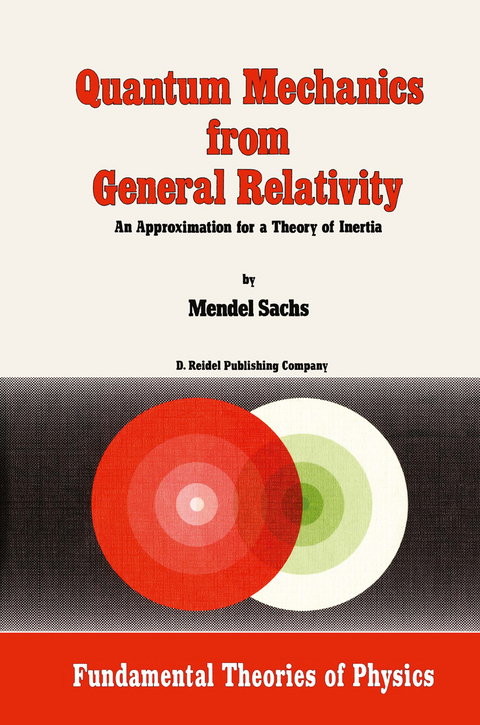
Quantum Mechanics from General Relativity
Springer (Verlag)
978-94-010-8573-1 (ISBN)
1 / Fundamental Outlook.- 2 / On the Comparison of the Quantum and Relativity Theories.- 2.1 Competing Concepts.- 2.2 Is the Quantum Jump Compatible with the Theory of Relativity?.- 2.3 Is the Theory of Relativity Complete as a Theory of Matter?.- 2.4 The Einstein—Podolsky—Rosen Paradox.- 2.5 The Hidden Variable Approach.- 2.6 Bell’s Inequalities and General Relativity.- 3 / Basis of a Matter Field Theory of Inertia — a Generalization of Quantum Mechanics.- 3.1. The General Mathematical Structure and Philosophical Implications.- 3.2. The Conservation of Interaction.- 3.3. Determinism.- 4 / A Covariant Field Theory of Inertia.- 4.1. On the Origin of Inertial Mass.- 4.2. The Spinor Formalism in Special Relativity.- 4.3. The Spinor Variables in General Relativity.- 4.4. The Spinor Matter Field Equations in General Relativity.- 4.5. Matter and Antimatter.- 4.6. On the Quantization of Electrical Charge from General Relativity.- 4.7. Conclusions.- 5 / The Electromagnetic Interaction.- 5.1. On the Meaning of the Electromagnetic Field Equations.- 5.2. Generalization of the Elementary Interaction Formalism.- 5.3. A Spinor Formulation of Electromagnetism.- 5.4. The Interaction Lagrangian.- 6 / Quantum Mechanics from the Matter Field Equations and Derivation of the Pauli Exclusion Principle.- 6.1. Approximations to Quantum Mechanics.- 6.2. The Pauli Exclusion Principle — a Derivation.- 6.3. The Hartree Approximation for the Matter Field Equations.- 6.4 Scattering Cross Section.- 7 / The Particle—Antiparticle Pair without Annihilation Creation.- 7.1. The Field Equations for the Particle—Antiparticle Pair.- 7.2. An Exact Bound State Solution for the Particle—Antiparticle Pair.- 7.3. The Energy and Momentum of the Bound Particle—Anti particle in its Ground State.-7.4. The Free Particle Limit and Pair Creation.- 7.5. The Continuity of Energy Values.- 7.6. Dynamical Properties of the Pair in the Ground State.- 7.7. The Compton Effect.- 7.8. Blackbody Radiation — a Derivation of Plank’s Law.- 7.9. The Anomalous Magnetic Moment of the Electron.- 8 / The Electron—Proton System.- 8.1. Linearization of the Hydrogen Field Equations.- 8.2. The Lamb Splitting.- 8.3. Deuterium and He+.- 8.4. The Lifetimes of Atomic Excited States.- 8.5. Atomic Helium.- 8.6. Electron—Proton Scattering in a Vacuum.- 8.7. Electron—Proton Scattering in a Background of Pairs.- 8.8. Summary.- 9 / Elementary Particle Physics.- 9.1. The Neutron.- 9.2. The Pion.- 9.3. On the Possible Origin of CP-Violation in Neutral Kaon Decay.- 9.4. On Time Reversal Noninvariance in Nuclear Forces — a Magnetic Resonance Experimental Test.- 9.5. Proton—Antiproton Collisions and the W±-Particle from General Relativity.- 9.6. Concluding Remarks.- Epilogue.- Appendix A / Computation of the Lamb Splitting 207.
| Reihe/Serie | Fundamental Theories of Physics ; 18 |
|---|---|
| Zusatzinfo | XVI, 227 p. |
| Verlagsort | Dordrecht |
| Sprache | englisch |
| Maße | 155 x 235 mm |
| Themenwelt | Sachbuch/Ratgeber ► Natur / Technik ► Garten |
| Naturwissenschaften ► Physik / Astronomie ► Allgemeines / Lexika | |
| Naturwissenschaften ► Physik / Astronomie ► Theoretische Physik | |
| ISBN-10 | 94-010-8573-0 / 9401085730 |
| ISBN-13 | 978-94-010-8573-1 / 9789401085731 |
| Zustand | Neuware |
| Haben Sie eine Frage zum Produkt? |
aus dem Bereich


